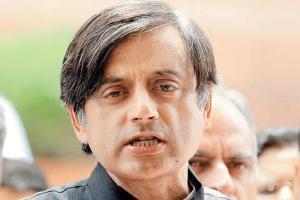shashi Tharoor has moved a privilege motion against a BJP MP for questioning his power to unilaterally summon Facebook representatives to a Parliamentary Standing Committee

Shashi Tharoor
With Shashi Tharoor moving a privilege motion against a BJP MP for questioning his power to unilaterally summon Facebook representatives to a Parliamentary Standing Committee, the BJP has realised the Congress' seriousness in the matter. The saffron party is also ready with two plans to block Tharoor's moves, with the first already set in motion.
ADVERTISEMENT
Lets talk about Plan B. If Plan A doesn't give the desired result, BJP is likely to set the backup plan in motion on September 1, when the Standing Committee on IT reconvenes. Facebook representatives have been summoned the next day, between 4 and 4.30 p.m. "on the subject 'Safeguarding citizens' rights and prevention of misuse of social/online news media platforms". Rules allow any member to question the move and seek voting over it.
Among the 21 Lok Sabha members in the committee, the BJP has 12 and an ally member. Among the 10 Rajya Sabha members, one has died, leaving only nine. Out of these nine, the BJP has 3 members and hopes to get the vote of a nominated member.
Strictly, on its own, the BJP has 15 members in the 30 member panel. If it considers ally LJP and a nominated member whose views align with the BJP, the ruling party will have 17 votes. Voting is not unusual, given that the last time the issue of WhatsApp Snooping came up, those who opposed summoning representatives called for a vote. However, the BJP lost that round. But this time, the BJP has started to work on its arithmetic.
However, the goal is not to lean on Plan B. The BJP's Plan A is to get Lok Sabha Speaker Om Birla to censure Tharoor, who is also the Chairman of the Standing Committee on Information Technology, which has summoned Facebook representatives to the committee on September 2, to explain allegations of favouritism for BJP lawmakers, against it.
Tharoor's colleague in the committee and increasingly the face of the BJP's opposition to Tharoor's move, Nishikant Dubey has set the ball in motion for Plan A, by writing to Birla, where he urged him to invoke Rule 283 of the Rules of Procedure and Conduct of Business in the Lok Sabha, to block Tharoor's bid.
The rule says, "The Speaker may from time to time issue such directions to the Chairperson of a committee, as the Speaker considers necessary, for regulating its procedure and the organisation of its work". In simpler words, the Speaker can step in to stop Tharoor if he deems fit.
Speaking to IANS, Dubey said, "The signing authority for summoning anyone to the committee is the Secretary General who in turn reports to the Lok Sabha Speaker and the Speaker does not report to anyone."
Stressing on this overarching power of the Speaker, Dubey has cited instances of Tharoor's alleged misconduct that includes him allegedly bypassing the committee members, talking through social media, his reference to the British House of Commons among others to argue that Tharoor be sent on "leave".
Even though many BJP members, without being named, have accepted that removing Tharoor is not going to be an easy task for even the Speaker, given the optics associated with the ongoing case, blocking Tharoor's summon seems to be well within the ambit of the laid down rule.
Did Facebook India favour BJP over others? While that seems to be at the core of the entire political fight, the ruling party has devised multiple strategies to win it.
Keep scrolling to read more news
Catch up on all the latest Crime, National, International and Hatke news here. Also download the new mid-day Android and iOS apps to get latest updates.
Mid-Day is now on Telegram. Click here to join our channel (@middayinfomedialtd) and stay updated with the latest news
This story has been sourced from a third party syndicated feed, agencies. Mid-day accepts no responsibility or liability for its dependability, trustworthiness, reliability and data of the text. Mid-day management/mid-day.com reserves the sole right to alter, delete or remove (without notice) the content in its absolute discretion for any reason whatsoever
 Subscribe today by clicking the link and stay updated with the latest news!" Click here!
Subscribe today by clicking the link and stay updated with the latest news!" Click here!






